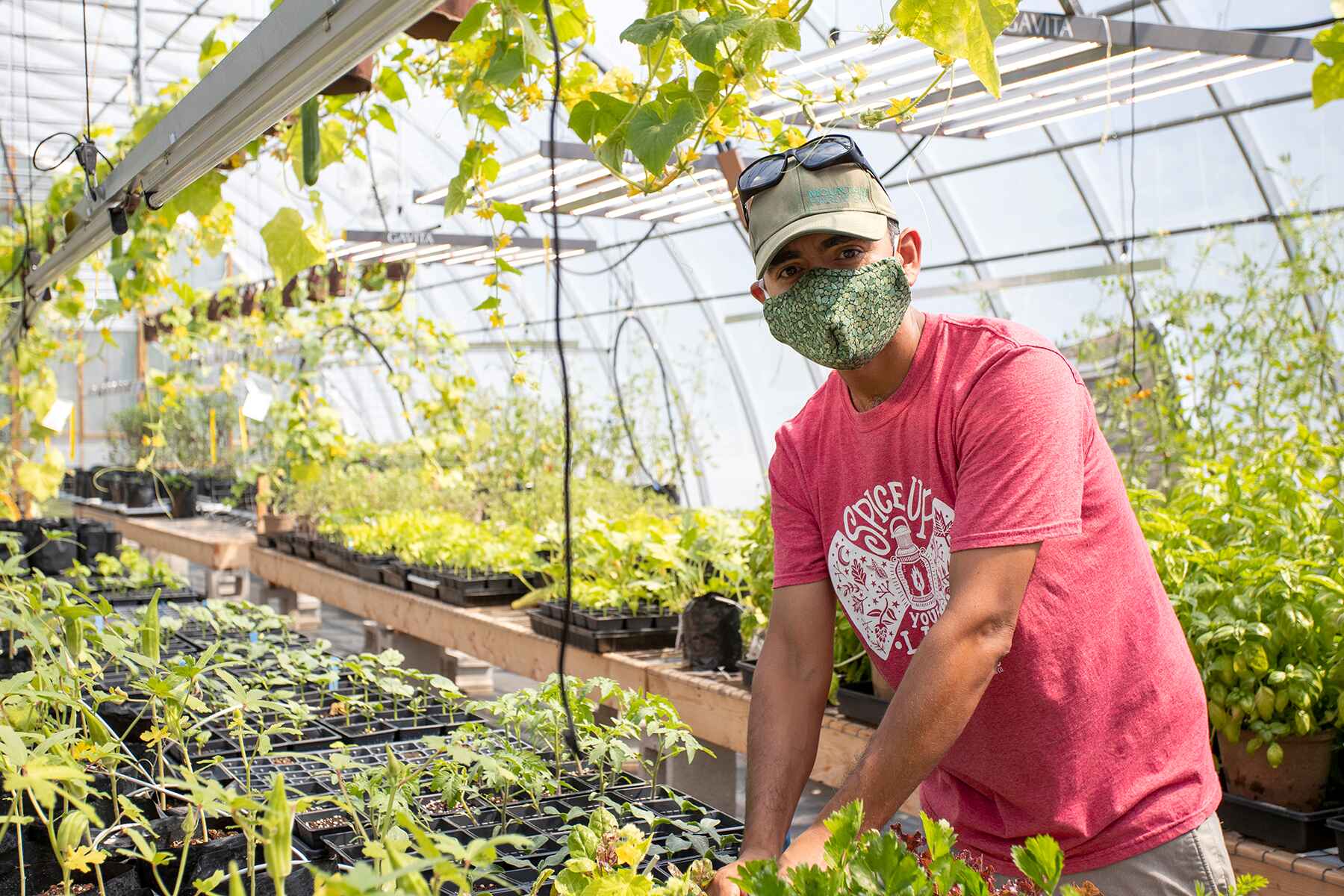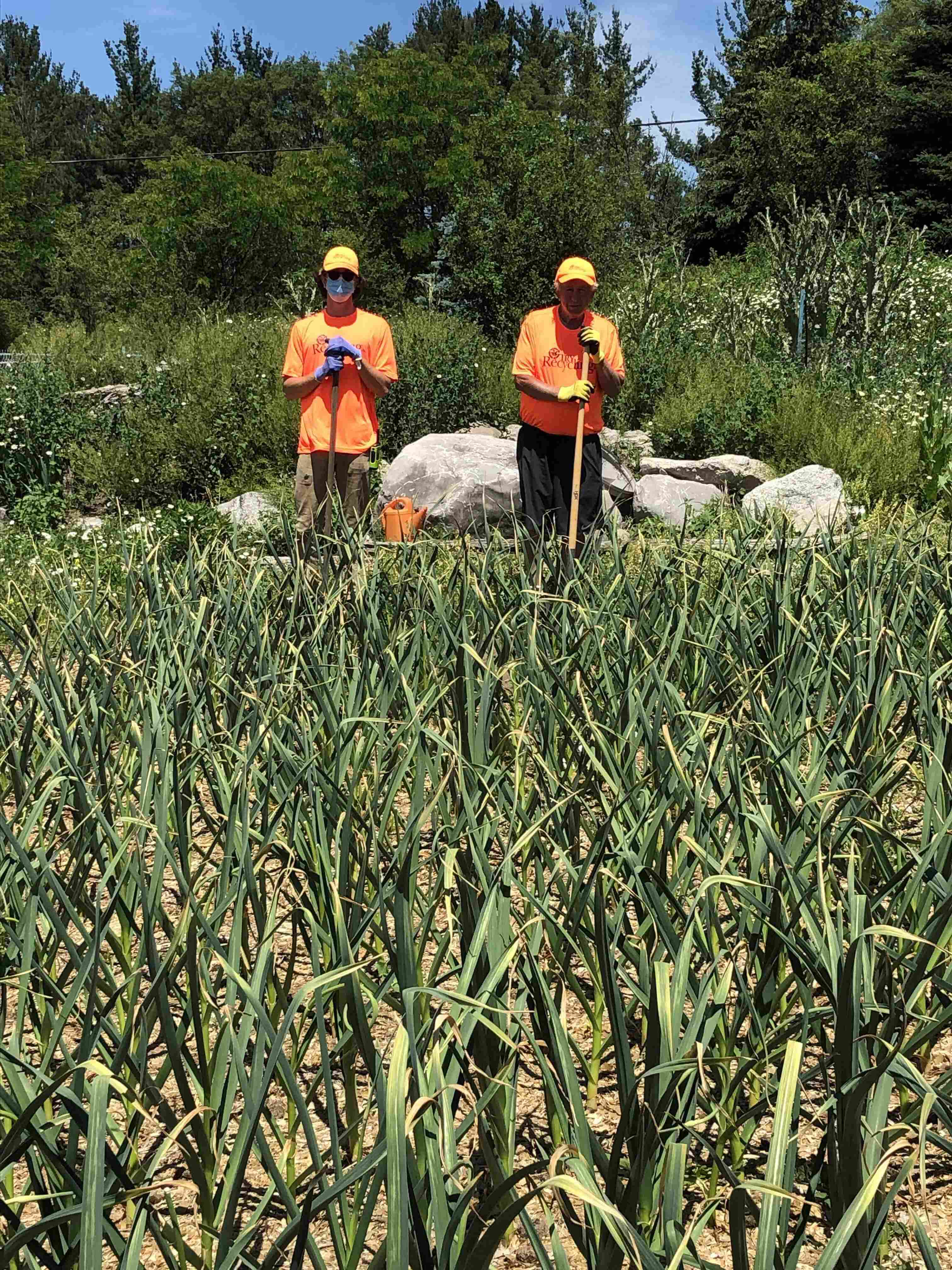London Cares Curb Hunger Campaign
Image
Image
The official website for the City of London, Ontario
The London Cares Curb Hunger Campaign, in partnership with the London Food Bank, spreads awareness of the need for fresh food, non-perishable food, and financial donations in our community.
The London Cares Curb Hunger Campaign has now helped Londoners for 28 years and is the longest-running partnership of its kind in Canada. The annual campaign raises awareness of the London Food Bank and the need for support during the summer months, which is traditionally a slower period for food donations. In 2023, residents, businesses, and community partners participated in another successful London Cares Curb Hunger Campaign to support the London Food Bank, collecting a total equivalent of 86,880 pounds of food, with even more fresh produce grown through the Campaign’s Grow-a-Row and Adopt a Plot.
By addressing food insecurity and encouraging community involvement, this Campaign highlights the importance of giving back and supporting our neighbours in need. Check out the success stories below to see how your donations make a tangible impact in the lives of Londoners in need, as well as how to get involved. In this year’s campaign, running from May 29 to June 8, 2024, we encourage Londoners to deliver non-perishable food, locally grown food and rescued food from grocery stores.
Check out Last year's Curb Hunger Food Campaign
Residents are encouraged to participate in a number of ways:
Both fresh and non-perishable foods continue to be accepted at the Food Bank, located at 926 Leathorne St.
Online donations at www.londonfoodbank.ca are vital and the quickest way to help the London Food Bank acquire fresh food. Financial donations give the Food Bank the necessary resources to help reach London’s most vulnerable, including individuals and families living unsheltered.
Londoners can sign up to help Grow-a-Row for the Food Bank in their backyard or community gardens. Growing your own produce at home is a great activity for families and households, and any extra produce from your garden can be donated to the Food Bank.
The London Food Bank now has on-site garden beds to grow vegetables for use in client hampers. Groups are welcome to sign up to adopt a plot of these gardens to help plant, raise, and harvest vegetables. Visit www.londonfoodbank.ca for more information about this program.
Non-perishable food donations can be left at your local fire hall or at participating grocery stores. Store locations can be found at www.londonfoodbank.ca.
So many individuals and organizations make the London Cares Curb Hunger campaign a success. We are grateful to everyone who works to help end food insecurity and encourage you to read the following stories for inspiration.
The London Food Bank and Meals on Wheels deliver fresh, affordable food to seniors
In recent years, the London Food Bank has enhanced its relationship with Meals on Wheels London. Research shows that food insecurity and hunger are increasing among older Canadians, especially those who have lost loved ones and live on fixed pensions. Part of the Food Bank’s mandate is to provide nutritious food supplies to these members of our community, but most seniors do not visit the Food Bank for assistance.
By forming a partnership, Meals on Wheels and the London Food Bank can leverage the generosity of Londoners to address the ongoing nutrition needs of our senior population. This partnership helps both organizations support their clients and provides an efficient solution through collaboration. This relationship will continue to provide both healthy food and convenient delivery to our seniors in need.
When food is wasted, so are all of the resources used in its production.
Food production requires a lot of resources. Getting food from the farm to your table requires water, land, fertilizer, and pesticides, as well as fuel for all the machines used in the process. Throughout their lifetime, food can travel thousands of kilometers – from the farm, to processing and distribution centers, grocery stores or markets, and finally, your home.
Each stage of the journey produces greenhouse gas emissions and contributes to global climate change. When food is wasted, all the resources that went into producing the food are also wasted. To make matters worse, discarded food then travels to the landfill where it contributes to methane gas.
There are many ways you can avoid wasting food and reduce your carbon footprint:
Buy together, save together! That’s the powerful premise behind the London Good Food Box, a program launched by the Glen Cairn Community Resource Centre. The program offers the opportunity to purchase fresh, healthy produce at a significant discount. Each box costs $14 but will usually contain over $20 worth of produce.
Working with a local farmer shopping at the Toronto Food Terminal, the program buys in bulk right from the source for high-quality items. “I would say the quality is better than the grocery store, actually.” says program coordinator Jazz Walmsley.
The program began in 2013 to help Glen Cairn residents access fresh food at a more affordable price. Since then, the program has grown and can be accessed through 19 different agencies, and 14 schools, across London. In May 2023, the program filled over 900 orders – its highest yet. Walmsley adds, “It’s great that so many people are using the program, but it also means that a lot of people in our community need the program. I’m glad we can help them.”
Good Food Boxes can be purchased with cash or Harvest Bucks, through a partnership with the London Food Bank, the Middlesex-London Health Unit and the participating agencies.
For a full list of participating agencies and more information about the program, visit gccrc.ca/goodfoodbox.
The Community Re-Fresh program ensures hundreds of tonnes of fresh and edible leftover fruit and vegetables, typically dumped into local landfills, is redirected to the London Food Bank.
This initiative has become a powerful movement to support the environment and individuals facing poverty. Last year, even during the pandemic, 55% of the food distributed by the London Food Bank was fresh. This is a staggering accomplishment that keeps food out of landfills, and into empty stomachs.
Community Re-Fresh also accepts financial donations to assist the Food Bank in obtaining eggs, cheese, and milk for clients.
Community Re-Fresh is a partnership between grocery stores, the City of London, Business Cares, and the London Food Bank.
The Harvest Bucks program exists to help low-income individuals get fresh food for their families while supporting local fresh food markets.
The primary goals of the program are to increase:
Every year, the London Food Bank spends over $100,000 funding the Harvest Bucks program. The Harvest Bucks program has been made possible in partnership with the London Food Bank, the Middlesex London Health Unit and other local agencies.

One of the most popular initiatives that the London Food Bank has undertaken in its 35-year history has been the large greenhouse built behind our main building. With the help of numerous volunteers, companies and individuals, the greenhouse was built just as the pandemic was beginning to surge.
It was becoming clear that to grow enough food fresh food for food-insecure families and individuals, the capacity for such an effort would need to be enhanced. This effort has dramatically improved our ability to provide fresh produce, not just to our clients but to other agencies as well.
With the help of Wayne Dunn and Business Cares, the London Food Bank is now offering free greenhouses and “green walls” to faith groups and organizations across the community to help continue to grow this capacity. All the costs for these efforts have been covered by Business Cares.
The community requires a more significant urban agriculture effort to take advantage of the richness of our soil. Greenhouses extend the growing season and bring the community together to donate and grow food for hungry families. It is a unique approach across this country and provides new opportunities to develop London’s potential.
Glen Pearson, Co-Director, London Food Bank

If you’ve ever dropped off yard waste, tires or construction waste at the City of London Oxford Street EnviroDepot, you may have noticed a garden, which has been operational since May 2017 thanks to the help of neighbourhood friends and TRY Recycling staff.
Growing in a space that was once a dumping ground for rubble, this community garden now produces vegetables for the London Food Bank. Over the years, the garden has produced tomatoes, carrots, beans, kale, beets, and a host of other vegetables. Now, to help limit the amount of produce lost to local wildlife before harvest, the garden primarily features garlic and potatoes.
Last season, gardener Ted Knezic (a retired London firefighter) and TRY team member Clovis Pinsonnault harvested nearly 500 lbs of potatoes and 300 heads of garlic for the London Food Bank. Ted and Clovis have been a crucial to the success and cultivation of this bountiful garden.
The garden is also a showcase for how compost can improve soil quality. The compost used at the garden has been produced by TRY Recycling from the yard waste materials dropped off at City of London EnviroDepots.
Partners